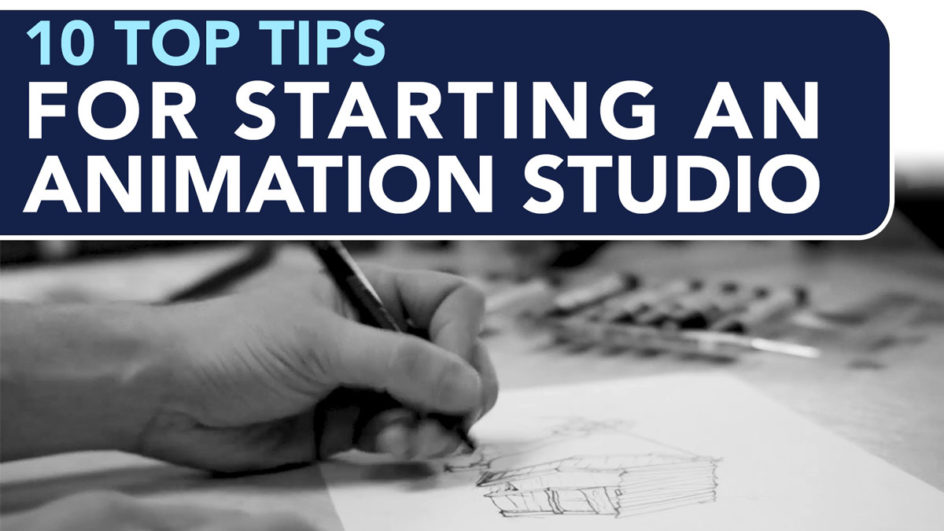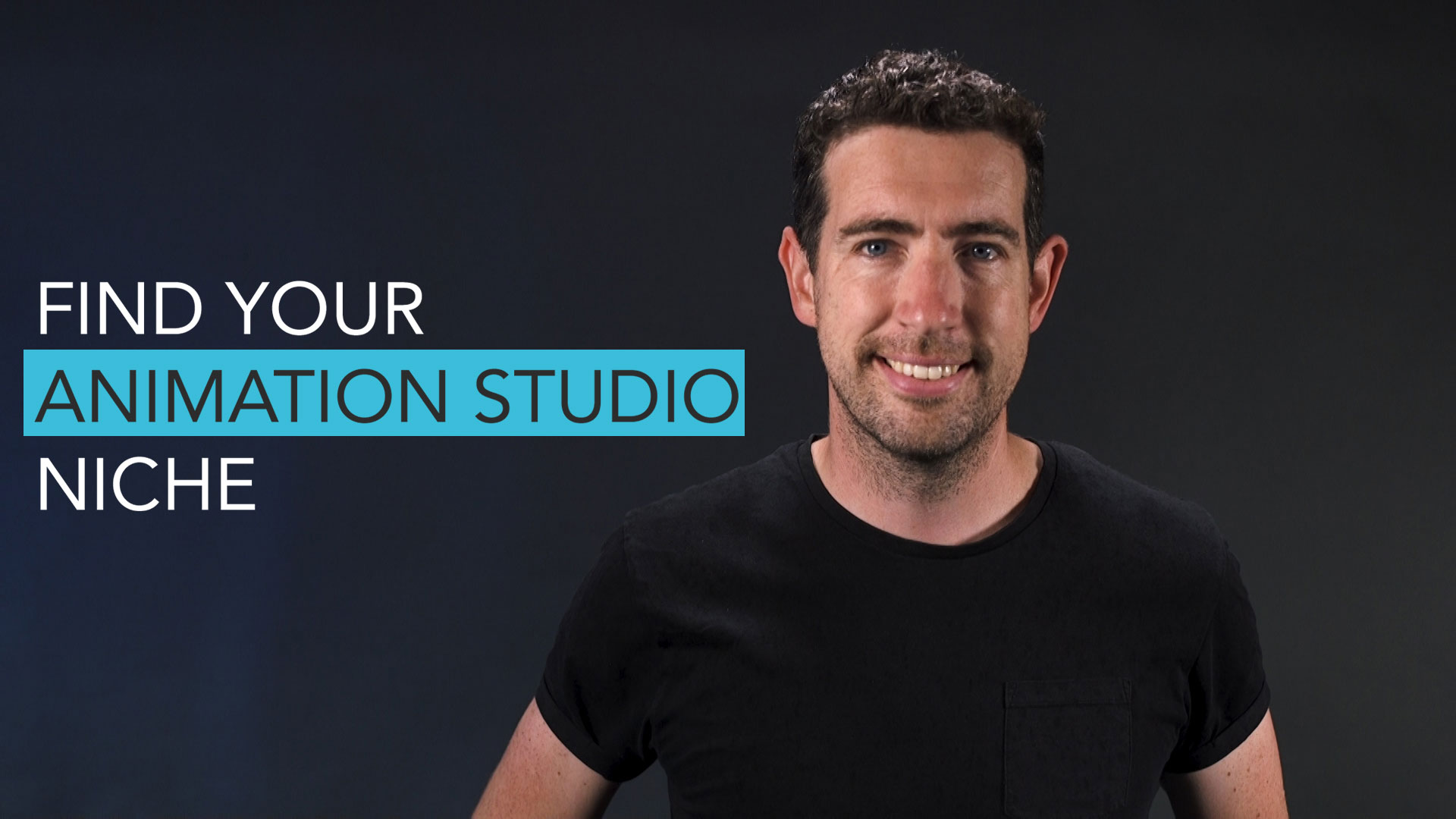
Founder of successful UK animation business 'Stormy Studio' shares: 10 top tips for starting an animation studio of your own.
If you're reading this page you're quite likely passionate about working as an animator and keen to setup a profitable animation business of your own.
Working as an animator itself is an highly rewarding job, with so many varied skill sets required. Everything from illustration, motion design, varied software knowledge, acting, composition, audio design, editing, story telling, writing, graphic design, programming and video encoding. (*to name a few)
The running of an animation studio, (or any startup business) requires the wearing of even more hats. This understanding of business needs to be developed over time. Whilst you may be able to afford to pay to have some aspects of the business taken care of, I'd recommend getting a grasp on all aspects to a good level before choosing what areas you do and do not want to work on yourself, and what (if anything) you can afford to outsource. Though paying for an accountant from the start of you animation studio is highly recommended.
The ability to professionally liase with clients, overseeing inhouse or remote staff, writing quotes, understanding web design, SEO, project management, book keeping, accounting, commissioning voiceovers, licencing music, understanding marketing and making key business decisions.
Knowing when to invest your time and money to try and generate new animation project leads and make a profit is key and not always easy.
Hopefully the below '10 top tips for starting an animation studio' will help give you a good head start.
Edit:
After originally writing this blog post years ago, I also started sharing videos on Youtube all on the subject of how to start your own animation business to help you launch your own viable animation studio. This eventually lead to the creation of full online video course, community, jobs board and other resources which you can check out at startastudio.com
Years after first writing this blog post and sharing related videos on Youtube. I went on to create an award-winning online course, jobs board and other resources to help you plan and launch your own viable animation studio.
Find out more via the link below.

1 • Manage your cashflow
Always charge something upfront to help manage cash flow… our studio has always been paid for work, though it often takes a while to arrive.
I learnt my lesson early on with our studio. Some projects inevitably stall for one reason or another. i.e. a project can get stuck in endless review, or a client leaves their job and you need to wait for the project to be picked up by their replacement.
Waiting for payday could soon force the closing of an otherwise quality animaton business and a percentage of upfront payment can quickly solve this issue.
Our studio now - always - charge 50% upfront, with immediate payment terms. Then normally 50% on completion (with 30-day payment terms). Or if its a large on going project, consider having agreed miles stones for two 25% increments.
Lastly, don't be afraid to chat about what works for your client. The sooner you can chat about the 'sauded subject of money', the less of an issue it will become.

Cashflow Management
"Our studio now - always - charge 50% upfront"
2 • Repeat business is king
This year 70% of our animation studios work has been from repeat business.
So with this in mind keep everyone sweet.. at times it is worth sucking up those extra annoying amends in exchange for future repeat business or recommendations.
Plus we’ve won more work from politely emailing old clients once every 6 months then any effort put into paid advertising.
3 • Google ads can be effective but pricey
If you do decide to use Google Adwords... plan to invest £400+ a month for a few months to get a campaign refined and one that works. To keep costs down, focus on long tail keywords… i.e. ‘Norwich animation production services’ rather than ‘animation studio’. The first will cost around 35p per click and be more likely to convert to paid animation business but you’ll get a lot less clicks. The other can easily cost £3.00 and above and is far less likely to generate a lead with a lot more costly clicks.
4 • Build that portfolio
I spent the first few months after founding our animation studio pitching and winning projects for ‘not a lot of money’. I did my best to make sure the work looked 'suitably awesome' to quickly build up a portfolio of quality work. You can see our studios main portfolio here for inspiration.
So having a pot of money or credit card to keep you a float for a while is definitely worth having in place if possible.
5 • Recommendations
Obviously your website is your digital shop window.. but I've find that recommendations built up from the small amount of real-life networking I did early on after first starting Stormy Studio, when still running the business from a spare room has paid off amazingly. Recommendations have been far better than any advertising we’ve invested in.
6 • Extra Online Portfolio 'Behance'
Whilst a website is, of course, great for your animation business portfolio and giving a destination for any advertising. I’d also recommend sharing your exceptional design work on Behance. There’s a real likelihood that design agency clients will browse, see that you’re offering the sort of work they’re after and get in touch directly.
Behance is also a great place to browse for inspiration and to see where the bar is being raised too in terms of design and creativity.
7 • Pitch for projects online
Pitching online for projects can be a great way to build portfolios, contacts and a reputation. Early on with our business, I chose to put time into pitches for sites with set project fees... like Genero and Wooshii (there are others). I prefer these to other freelancing sites, where you quote, as these create a race to the bottom on price. So a chance for you to win work through a well written succinct pitch and quality examples and showreel seems like a far better long term approach.
Of course you'll need to make a judgement on whether you're likely to win the job. If you think it’s highly likely someone has more relevant examples than you, consider spending your time on something else more beneficial to your business.
Also if its a particularly high profile or a large budget job and you’re still in the early days with you business maybe think twice before investing considerable hours or even days producing an elaborate pitch, unless you beleive you can offer something extra special.
If you do spend time on an elaborate pitch but fail to win the work, make sure to reach our for any constructive critism so you can improve future proposals. Our animation studio made a concious effort to tackle a series of large tender opportunities over a 6 month period. We did not expect to win the first few, but hoped to learn from the time spent. Happily the feedback was always very helpful and positive and we've gone onto to be successful in a good number of competitive tender opportunities.
8 • Effective business networking
I'm a cynical old animator at times, so I'm naturally a little introverted and I'm not overly keen on attending an intentionally sales'y networking session.
That said, I did put the effort in early on with the launch of our animation business. I'd be up at 6am and off for an early fried breakfast at local business networking sessions. I made friends, useful contacts and generated some great business opportunities as a result.
Whilst networking and meeting a direct client who may be interested in the production of an animated video is potentially good.
There’s increased value in meeting local companies that would benefit from offering their clients your animation production services. This opens up the possibility of repeat business. With this in mind try and speak with web design companies, marketing companies, PR companies, idea development/concept companies, ad space selling companies, event/conference hosting companies etc.
Admittedly now, 5 years on, my enthusiasm for networking sessions hasn't improved.
9 • It's okay to say 'No'.
It’s sometimes worth saying no to little jobs if you think there’s little likely hood of it leading to something bigger. It’ll free you up to concentrate on time on your site and landing those bigger jobs. It's a balance of course...
10 • Find your animation studio niche
Whilst as an animator/designer you can no doubt produce a video on any subject. A client will be more willing to give a project to someone who is the expert in the production of videos related to their specific need.
Finding that focus means you’ll naturally work with experts in the field too, scriptwriters you work with will know the subject, you’ll develop understanding other generalist studios don’t have.
So consider finding your niche… i.e. be the experts in one field. ‘Children early learning animation’, ’medical animation’, etc etc.. You can still offer wider animation skills, but have pages on your website that really highlight your speciality.
For Stormy Studio, whislt we do produce work for a wide range of industries we have built up a good reputation for producing high quality and engaging health and safety animation.
11 • Bonus • Consider offering a percentage
Consider offering a percentage or flat fee for recommendations/introductions that lead to paid work.
This can work well with agencies/web design companies or just individuals who do lots of networking.
It has the benefit of repeat business being all yours and reduces the need for a middle man, where an agency may at times get in the way of communicating directly with an end client.
It also means you have someone helping to market your business, with you only paying for successful leads.
Recap: 10 Top Tips For Starting An Animation Studio
1. Manage your animation startups cashflow (Always charge 50% upfront)
2. Repeat business is very important, so provide a quality production service.
3. Google Ads can be very costly but if apporached correctly they can be affordable and effective.
4. Build a high quality & relevant portfolio as quickly as possible.
5. Recommendations from happy clients are better than any paid advertising.
6. Extra online [ortfolios (on Behance) are an effective animation showcase for work and lead generation.
7. Pitch for business animation work online. (Find the fixed budget projects.)
8. Maximise networking effort with contacts that can offer your animation services to their clients.
9.It’s okay to say 'No' to small animation jobs.
10. Specialise - Find your animation niche
(One for luck) 11. Offer a fee or precentage for introductions that lead to paid animation work.
That's a wrap...
Hopefully the above 10 top tips for starting your own animation studio (well 11 top tips) are of value to budding freelance animators, seasoned animators, producers and entrepreneurs looking to start or grow their own studio.
Cheers... Jon Draper - Founder of Stormy Studio.
After lots of pondering... our studio launched an online course, jobs board and community to help you plan and start your own animation studio.



